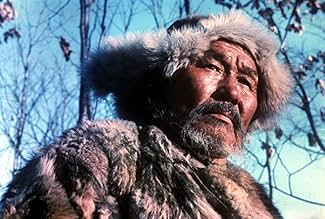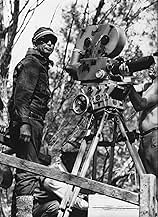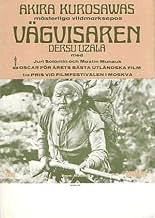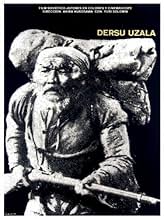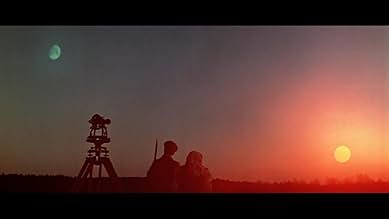The Russian army sends an explorer on an expedition to the snowy Siberian wilderness where he makes friends with a seasoned local hunter.The Russian army sends an explorer on an expedition to the snowy Siberian wilderness where he makes friends with a seasoned local hunter.The Russian army sends an explorer on an expedition to the snowy Siberian wilderness where he makes friends with a seasoned local hunter.
- Won 1 Oscar
- 8 wins & 1 nomination total
Mikhail Bychkov
- Otryad Arseneva
- (as M. Bychkov)
Vladimir Khrulyov
- Otryad Arseneva
- (as V. Khrulyov)
Stanislav Marin
- Otryad Arseneva
- (as S. Marin)
Igor Sykhra
- Otryad Arseneva
- (as I. Sykhra)
Vladimir Sergiyakov
- Otryad Arseneva
- (as V. Sergiyakov)
Yanis Yakobsons
- Otryad Arseneva
- (as Ya. Yakobsons)
Vladimir Khlestov
- Otryad Arseneva
- (as V. Khlestov)
Vladimir Sverba
- Otryad Arseneva
- (as V. Sverba)
Vladimir Kremena
- Turtygin
- (as V. Kremena)
Aleksandr Pyatkov
- Olenev
- (as A. Pyatkov)
- Director
- Writers
- All cast & crew
- Production, box office & more at IMDbPro
Storyline
Did you know
- TriviaAkira Kurosawa had hoped to make this film as early as in the 1950s, but he had trouble adapting the story to a Japanese setting, never thinking that one day he would actually be able to film it on location in Russia, and with Russian actors.
- GoofsWhen Dersu and Arsenev are looking at the 3/4 moon and the setting sun, the moon is in the wrong phase to appear in the sky at the same time as the sun.
- Quotes
Dersu Uzala: How can people live in a box?
- ConnectionsFeatured in For the Love of Movies: The Story of American Film Criticism (2009)
Featured review
For a variety of reasons (that are well known in the darker period of the director's history at this time), Akira Kurosawa left Japan to make a film in Russia (Siberia to be exact). Instead of an epic action picture, he went to one of his other passions as a storyteller- the drama of pure humanity (like Ikiru and Red Beard, this film follows in that vein). The film runs two hours and twenty minutes, but it is a kind of epic story, that does have that pulse of adventure from his other films. But this time he combines that method of a big, spacious environment in the wild with a deep character study. His craftsmanship as a 'painter' of the frame is top-notch as always (all pretensions aside, he is one of the masters at finding the textures and moods in a scene's look as in its character and action), and the use of locations brings a quality that directors today would brush aside with via special and visual effects. Simply put, it is one of, if not the, ultimate testaments to man vs/with nature, with a character that remains one of the most memorable that Kurosawa's envisioned.
To give an idea of who Dersu Uzala is to someone who hasn't seen the film, picture Yoda without the ability to lift objects with his mind and to kick ass with a light-saber, but still contains all of the direct wisdom and strength that make him one with his surroundings (and, as well, uses his own kind of 'force' for knowledge and defense, and for attack as an ultimately final resort). As a lonesome hunter and drifter with a family tragically lost, Dersu comes upon a team of explorers led by Captain Aseniev (Yuri Solomon, not the best performance but sturdy enough to sustain the physical scenes). He goes along with them as a guide of the sights and smells and feelings that the others just can't sense (out of lack of experience). Aseniev and Dersu end up becoming friends as they brace a torrid windstorm over a bare, wintry landscape, as Kurosawa brings out one of his towering sequences (topping anything David Lean could've drummed up for sure).
It's always of interest to me to see characters doing things on screen, having to go against the elements that almost dwarf them in the face of nature (i.e. Cast Away's hour and a half second act). Dersu Uzala seems to be of few words and mostly actions, and soon gains respect and admiration after an odd introduction to the team- he shoots with a keener than keen eye, he spots tracks, he sets up protection in the harshest of conditions, and is always a step ahead of the pack. And bringing all this out is actor Maksim Munzuk, who appears here (like Falconetti in Passion of Joan of Arc) in the performance of a lifetime out of an otherwise obscure and small career. Munzuk never brings anything to Dersu that isn't in his character, and he makes at least a quarter of the film's success a reality (the other three-quarters could be attributed to Kurosawa alone). He can be tough, smart, funny (in an off-beat way), and if nothing else, humble. But more than anything, Munzuk makes Dersu seem alive in a way no other actor could've accomplished, and also brings out the better in Solomon's performance.
The story itself has a superb appeal most of the way, but it is in it's last act that 'Derzu Uzala' reaches an intensely tragic plane. Dersu does something (which I won't reveal here and has been discussed elsewhere on the message board) that brings great shame to his own self-worth. In this part of the film, Kurosawa brings out what can be said to be some of the saddest moments in any of his work, however not without logic. While it was likely a major dramatic function in the novel, Kurosawa doesn't just throw these last twenty minutes or so to let steam flow out of the picture. I sensed something almost cathartic about these scenes, that rose the qualities of the rest of the story to a higher level, to one of almost spiritual in nature. It's hard to really pin-point to one who has not seen the film (and, indeed, I have seen the film all of one time). But once its over, you may feel you have seen a work far more rewarding than imaginable- even in awe.
To give an idea of who Dersu Uzala is to someone who hasn't seen the film, picture Yoda without the ability to lift objects with his mind and to kick ass with a light-saber, but still contains all of the direct wisdom and strength that make him one with his surroundings (and, as well, uses his own kind of 'force' for knowledge and defense, and for attack as an ultimately final resort). As a lonesome hunter and drifter with a family tragically lost, Dersu comes upon a team of explorers led by Captain Aseniev (Yuri Solomon, not the best performance but sturdy enough to sustain the physical scenes). He goes along with them as a guide of the sights and smells and feelings that the others just can't sense (out of lack of experience). Aseniev and Dersu end up becoming friends as they brace a torrid windstorm over a bare, wintry landscape, as Kurosawa brings out one of his towering sequences (topping anything David Lean could've drummed up for sure).
It's always of interest to me to see characters doing things on screen, having to go against the elements that almost dwarf them in the face of nature (i.e. Cast Away's hour and a half second act). Dersu Uzala seems to be of few words and mostly actions, and soon gains respect and admiration after an odd introduction to the team- he shoots with a keener than keen eye, he spots tracks, he sets up protection in the harshest of conditions, and is always a step ahead of the pack. And bringing all this out is actor Maksim Munzuk, who appears here (like Falconetti in Passion of Joan of Arc) in the performance of a lifetime out of an otherwise obscure and small career. Munzuk never brings anything to Dersu that isn't in his character, and he makes at least a quarter of the film's success a reality (the other three-quarters could be attributed to Kurosawa alone). He can be tough, smart, funny (in an off-beat way), and if nothing else, humble. But more than anything, Munzuk makes Dersu seem alive in a way no other actor could've accomplished, and also brings out the better in Solomon's performance.
The story itself has a superb appeal most of the way, but it is in it's last act that 'Derzu Uzala' reaches an intensely tragic plane. Dersu does something (which I won't reveal here and has been discussed elsewhere on the message board) that brings great shame to his own self-worth. In this part of the film, Kurosawa brings out what can be said to be some of the saddest moments in any of his work, however not without logic. While it was likely a major dramatic function in the novel, Kurosawa doesn't just throw these last twenty minutes or so to let steam flow out of the picture. I sensed something almost cathartic about these scenes, that rose the qualities of the rest of the story to a higher level, to one of almost spiritual in nature. It's hard to really pin-point to one who has not seen the film (and, indeed, I have seen the film all of one time). But once its over, you may feel you have seen a work far more rewarding than imaginable- even in awe.
- Quinoa1984
- Feb 19, 2005
- Permalink
- How long is Dersu Uzala?Powered by Alexa
Details
- Release date
- Countries of origin
- Official site
- Languages
- Also known as
- Uzala, der Kirgise
- Filming locations
- Production companies
- See more company credits at IMDbPro
Box office
- Budget
- $4,000,000 (estimated)
- Gross worldwide
- $14,480
- Runtime2 hours 22 minutes
- Color
- Aspect ratio
- 2.20 : 1
Contribute to this page
Suggest an edit or add missing content



